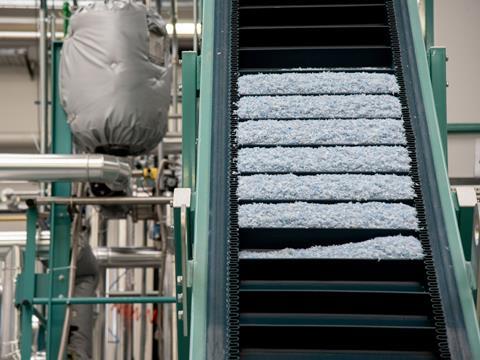
GR3N has announced the opening and launch of an industrial demonstration plant for its microwave-assisted depolymerization (MADE) technology in the hopes of becoming the ‘world’s leading supplier’ of PET and polyester rebuilt from recycled monomers.
GR3N’s alkaline hydrolysis process is designed to break PET waste down into its building blocks. At its demonstration plant, the company shreds and depolymerizes plastic waste, at which point the resultant thermoplastic polyamide elastomers (TPA) and monoethylene glycol (MEP) are purified in a solid process.
From here, a dedicated 500kg polymerization reactor creates new PET chips.
Through this process, GR3N expects to close the loop on PET and derive food-grade polymers from a range of end-of-life plastics – both post-consumer and post-industrial polyesters; coloured, colourless, transparent, opaque, and textile products; and waste made from 100% polyester or containing up to 30% polyurethane, cotton, polyether, polyurea, and more.
In theory, it is set to unlock infinite repolymerization to provide virgin-quality polymers made from recycled monomers. The recycled products claim to offer the same functionality as traditional virgin alternatives and thus hope to phase out fossil fuel feedstocks.
MADE is also anticipated to cut down on carbon dioxide emissions. It eventually hopes to achieve bottle-to-textile, textile-to-textile, or textile-to-bottle recycling.
The technology has been installed at the company’s research and manufacturing facility in Albese con Cassano, which is located near Lake Como. Now the company has completed the final stage before commercialization and reports that an initial hydrolysis has been successful.
This is set to prove the scalability of the MADE process, although GR3N clarifies that the operating parameters are still being optimized.
“This is another step ahead for GR3N, as it will allow us to increase our capacity and then test the material, that we can produce with our own polymerization line, for several applications,” explained Dr. Maurizio Crippa, founder and chief executive officer at GR3N. “When you develop a new process the upscaling is a pivotal step.
“Being able to receive feedstock and transform it into new PET chips at scale will help us demonstrate that obtaining pure monomers is the only way to obtain virgin-like PET.
“The demonstration plant includes a depolymerization reactor capable of processing 60kg of PET per hour, which is the equivalent of almost 2000 bottles, the yearly consumption of 2 people. This is a turning point for GR3N, as with this plant we will be able to fine-tune the process the already existing Process Design Package of the 40K Tons industrial plant.”
The development comes after GR3N entered a joint venture with Intecsa Industrial to build a ‘first-of-a-kind’ manufacturing facility for its MADE technology. Aiming to produce 40,000 tons of recycled PET every year by 2027, the facility also hopes to save 2 million tons of CO2 in its operating life, bring enhanced recycling to industrial scale, and divert waste away from incineration and landfill.
Carbios and Landbell Group have also signed a non-binding Memorandum of Understanding to source, prepare, and recycle 15kT of post-consumer PET waste every year for Carbios’ biorecycling plant from 2026. Carbios’ enzyme – reported as the best-performing under industrial conditions in an ACS Catalysis article – breaks the plastic down into PTA and MEG to be rebuilt into new PET.
If you liked this story, you might also enjoy:
The Brief: How viable is biorecycling for plastics?
Report: How the top brands are progressing on packaging sustainability
The Brief: Using ocean-bound plastic in packaging – how, why and should we?













No comments yet